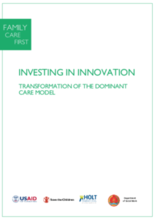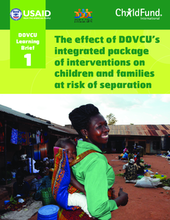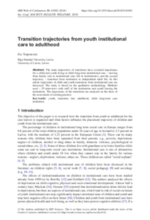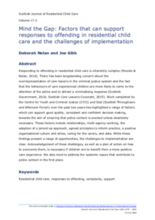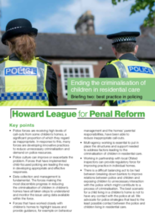Displaying 691 - 700 of 992
This study focuses on the preparation for social reintegration of young Indian girls about to leave their residential care homes.
This study and documentation of existing reintegration and alternative family care services in Cambodia was designed to build the capacity of existing service providers to take emerging good practice to scale as an increased number of residential care institutions transition.
This learning brief analyzes quantitative data from the first of the project’s stated objectives: examining the extent to which “Deinstitutionalization of Orphans and Vulnerable Children in Uganda” (DOVCU) project interventions decrease vulnerabilities for households and children at risk of separation.
In this article trajectories of child and youth transitions from institutional care are discussed.
This volume is an effort to highlight best practices for children without parental care.
This report marks a critical step in compiling comparable data and information about children in out-of-home care in Asia, defining our understanding of the continuum of care options available and metaphors to identify the gaps, challenges, strengths and opportunities within the child care systems in 10 identified Asian countries.
This report aims to address some common and key themes emerging from a questionnaire and in-person meeting to discuss the role of the social service workforce in the inclusion of migrant children and young people.
This article highlights a range of factors which can support good quality, consistent and confident decision making, towards the aim of ensuring that care leavers' contact with police is avoided unless absolutely necessary.
This is the second briefing paper published as part of the Howard League’s two-year programme to end the criminalisation of children in residential care. It explores how good practice in the policing of children’s homes can significantly reduce the unnecessary criminalisation of vulnerable children and demand on police resources.
This six-part video series provides an overview of the United States National Youth in Transition Database (NYTD) and the NYTD Review, a federal review conducted by the Children’s Bureau to assess how states collect and report data on youth transitioning out of foster care.


